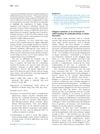 27 citations,
July 2017 in “European Journal of Dermatology”
27 citations,
July 2017 in “European Journal of Dermatology” Certain microRNAs are linked to various skin diseases and could be used to diagnose and treat these conditions.
[object Object]  27 citations,
August 2014 in “Wiley interdisciplinary reviews. Developmental biology”
27 citations,
August 2014 in “Wiley interdisciplinary reviews. Developmental biology” The skin and thymus develop similarly to protect and support immunity.
 23 citations,
January 2010 in “Journal of Medical Primatology”
23 citations,
January 2010 in “Journal of Medical Primatology” Hair loss in Rhesus macaques may be caused by a skin allergy-related condition.
 21 citations,
April 2010 in “Molecular Medicine Reports”
21 citations,
April 2010 in “Molecular Medicine Reports” Zinc supplementation may help improve treatment outcomes for chronic hepatitis C.
 18 citations,
November 2020 in “Frontiers in Cell and Developmental Biology”
18 citations,
November 2020 in “Frontiers in Cell and Developmental Biology” Inflammation plays a key role in activating skin stem cells for hair growth and wound healing, but more research is needed to understand how it directs cell behavior.
 18 citations,
January 2017 in “Dermatologic Surgery”
18 citations,
January 2017 in “Dermatologic Surgery” Combining cosmetic procedures with lifestyle changes improves antiaging results.
16 citations,
December 2015 in “Journal of Investigative Dermatology” Alopecia areata involves persistent gene abnormalities and immune activity, even in regrown hair, suggesting a risk of relapse.
15 citations,
December 2018 in “International journal of environmental research and public health/International journal of environmental research and public health” EGCG may help treat alopecia areata by blocking certain immune responses and reducing specific harmful immune cells.
 14 citations,
August 2018 in “Frontiers in Cellular and Infection Microbiology”
14 citations,
August 2018 in “Frontiers in Cellular and Infection Microbiology” Dengue virus can infect human hair follicle cells and may cause hair loss.
 11 citations,
June 2016 in “npj Regenerative Medicine”
11 citations,
June 2016 in “npj Regenerative Medicine” The symposium concluded that understanding how different species repair tissue and how this changes with age can help advance regenerative medicine.
 10 citations,
May 2020 in “Dermatology Research and Practice”
10 citations,
May 2020 in “Dermatology Research and Practice” Proteoglycans are important for hair growth, and a specific treatment can help reduce hair loss.
 9 citations,
April 2023 in “Frontiers in immunology”
9 citations,
April 2023 in “Frontiers in immunology” New technologies help us better understand how skin microbes affect skin diseases.
 9 citations,
February 2022 in “Nature communications”
9 citations,
February 2022 in “Nature communications” Rare changes in the KRT82 gene are linked to a higher risk of Alopecia Areata.
 7 citations,
February 2018 in “InTech eBooks”
7 citations,
February 2018 in “InTech eBooks” Biomaterials combined with stem cells show promise for improving tissue repair and medical treatments.
 7 citations,
October 2019 in “Elsevier eBooks”
7 citations,
October 2019 in “Elsevier eBooks” Maintaining skin health is crucial for overall well-being and involves protecting against environmental damage and using skincare products.
 6 citations,
May 2020 in “Scientific reports”
6 citations,
May 2020 in “Scientific reports” Researchers identified genes and proteins that may influence wool thickness in sheep.
[object Object]  4 citations,
November 2023 in “Frontiers in immunology”
4 citations,
November 2023 in “Frontiers in immunology” New treatments targeting T-cell pathways are needed for better alopecia areata management.
 4 citations,
January 2018 in “Elsevier eBooks”
4 citations,
January 2018 in “Elsevier eBooks” Hormones are crucial for regulating body functions and imbalances can lead to health issues.
 4 citations,
November 2014
4 citations,
November 2014 The skin protects the body, regulates temperature, senses touch, and makes vitamin D.
 3 citations,
November 2023 in “Frontiers in cell and developmental biology”
3 citations,
November 2023 in “Frontiers in cell and developmental biology” Melanocytes are important for skin and hair color and protect the skin from UV damage.
3 citations,
July 2023 in “Biomolecules” B2m-free HLA variants may be a new class of HLA important in immune responses and diseases.
 3 citations,
June 2023 in “Frontiers in medicine”
3 citations,
June 2023 in “Frontiers in medicine” Oxidative stress may contribute to hair loss in alopecia areata and antioxidants could potentially help as a treatment.
 3 citations,
August 2022 in “Curēus”
3 citations,
August 2022 in “Curēus” The SARS-CoV-2 vaccine may be linked to triggering autoimmune conditions like Alopecia Areata.
3 citations,
September 2021 in “BioEssays” Dandruff might be caused by changes in how hair follicles naturally release oils and an immune response to this imbalance.
 3 citations,
April 2019 in “The journal of investigative dermatology/Journal of investigative dermatology”
3 citations,
April 2019 in “The journal of investigative dermatology/Journal of investigative dermatology” ILC1 cells contribute to hair loss in alopecia areata.
 3 citations,
May 2018 in “InTech eBooks”
3 citations,
May 2018 in “InTech eBooks” Animal models, especially mice, are essential for advancing hair loss research and treatment.
 3 citations,
August 2014 in “Journal of The American Academy of Dermatology”
3 citations,
August 2014 in “Journal of The American Academy of Dermatology” Filaggrin mutations are linked to atopic dermatitis and help explain how genetics and environment affect the disease.
 2 citations,
November 2023 in “Frontiers in microbiology”
2 citations,
November 2023 in “Frontiers in microbiology” The health of the gut may be important in developing new ways to prevent, diagnose, and treat alopecia areata.
 2 citations,
May 2023 in “Frontiers in immunology”
2 citations,
May 2023 in “Frontiers in immunology” Skin stem cells remember past inflammation, helping them respond better to future injuries and possibly aiding in treating skin issues.
 2 citations,
January 2014 in “Hair therapy & transplantation”
2 citations,
January 2014 in “Hair therapy & transplantation” New treatments for hair growth disorders are needed due to limited current options and complex hair follicle biology.


























